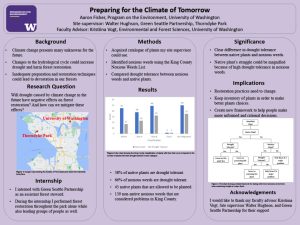Preparing for the Climate of Tomorrow
Forest restoration is an important tool to bring biodiversity back into areas that have been overrun by non-native noxious weeds. This process has found success in many places, but with increasing climate change many unknowns regarding the efficacy of forest restoration are left unanswered. In the Pacific Northwest, a major impact of climate change will be changes to the hydrological cycle, which could come in the form of increased and more severe drought. Subsequent effects on forest restoration are unclear and not fully realized. The goal with this project was to identify potential problems that forest restoration could have in the future when considering increased drought caused by changes in future climate. In order to identify how drought could affect forest restoration I used resources provided through my internship as well as information from the Washington State Noxious Weeds Control Board to identify drought tolerance in native and non-native plants. Resulting data showed that a minority of all native plants were drought tolerant while the majority of noxious weeds were drought tolerant. Native plants typically used in local restoration projects are not adapted to drought as well as non-native plants, meaning that increased drought with future climate could have significant negative effects on forest restoration.
